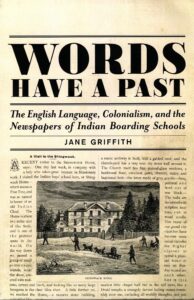Book review: Words Have a Past: The English Language, Colonialism, and the Newspapers of the Indian Boarding Schools
Jane Griffith in Words Have a Past: The English Language, Colonialism, and the Newspapers of the Indian Boarding Schools uses language to explore the narrative expressed in newspapers printed in Indian Boarding Schools during the nineteenth century. The school newspapers, Griffith notes, were markers of civilized pursuits. Although they were printed by the students, who also occasionally contributed content, the main contributors to the papers were the settler staff who also served as editors and censors.
Griffith’s study draws newspapers published by the Shingwauk Industrial Home, Battleford Industrial School, Rupert’s Land Industrial School, Regina Industrial School, and the Kitamaat Home. She reads the newspapers as propaganda, resistance, and repositories to understand the “publication’s different authors, audiences, receptions, and purposes.” Such a reading allows for the colonial and student voices to become apparent while exposing how the papers presented colonialism and the English language as “natural, unmarked, and innocent” to reading audiences. Griffith also encapsulates within her work the ideas of first and lasting, beforing and aftering, as well as differentiating colonial space and colonial place as found within the pages of the newspapers. For example, the papers celebrated the first settler in an area while remembering the passing of the Indian Chief who signed a treaty. Images of children before and after entering the schools or discussions of the land before and after White development. Colonial place, according to Griffith, is the idea that all the land is empty until developed or settled which turns place into space – forests became cities, schools cleared forests for farms. Griffith presents all of these imaginaries cast from the pages of the papers.
I like how Griffith argues that these school newspapers cast time as the culprit for the eventual extinction of Indigenous peoples. This view of time left settlers ‘blameless’. The culpability of time also served the notion of language loss. The concept of loss shifts the blame for disappearing languages from settlers onto Indigenous peoples. Griffith argues it was not language loss but linguicide.
I also found it interesting how administrators and teachers, such as E. F. Wilson, Principal of the Shingwauk Home, collected and preserved for posterity the very languages they were attempting to extinguish. Griffith argues that collection efforts were about preserving and knowing, or more specifically, about who gets to know and not know. Griffith then links the colonial power of knowing with notions that settlers could and would be the experts in Indigenous cultures. She also ties the work of people like Wilson to the emerging field of ethnology.
Finally, I found Griffith’s discussion of student resistance through the use or non-use of English as important to understanding colonialism’s framings. For instance, papers “fram[ed] students who learned English as assimilated while those who continued to speak Indigenous languages as slow”, while contemporary survivor testimony indicates that neither was the case. She also teases out acts of resistance by acknowledging the reframing at work in the pages of the newspapers. Celebrations of family visits by students are interpreted as maintaining ties that the schools wanted to sever. The reporting of students successfully debating in English is recast when Griffith shows that the paper noted that the debate club failed to unanimously dis/agree that Indians were better off before settlers. Or, when the papers carried stories of students “play[ing] grandmother” in a teepee on school grounds. These and other examples can be found with careful reading by knowing the newspapers were seen as colonizing tools.
Words Have A Past is an excellent exploration of nineteenth-century Boarding School newspapers. Through her work, the subtleties of the newspapers’ language usage that was spoken, written, unspoken, and unwritten is solidly tied to Canadian colonialism both past and present. It is a marvellous exploration of the language of colonialism, how the English language was cast as an innocent neutral force, and how this continues to be reflected in contemporary Canada. The book is easily accessible for all readers, well researched, and documented. It is simply a must-read that will aid in developing a deeper understanding of language, and colonialism roots and their ongoing impact in the present.
Jane Griffith, Words Have A Past: The English Language, Colonialism, and the Newspapers of the Indian Boarding Schools. Toronto: University of Toronto Press, 2019.


